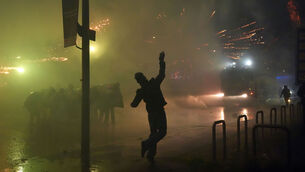EU ministers decide not to outlaw Nazi symbols
European Union justice ministers have shelved proposals to outlaw the use of Nazi symbols after failing to agree on how such a ban could help fight racism and anti-Semitism.
They were suggested by German members of the European Parliament after the publication of pictures last month showing Britain's Prince Harry wearing a Nazi swastika armband at a fancy dress party.














